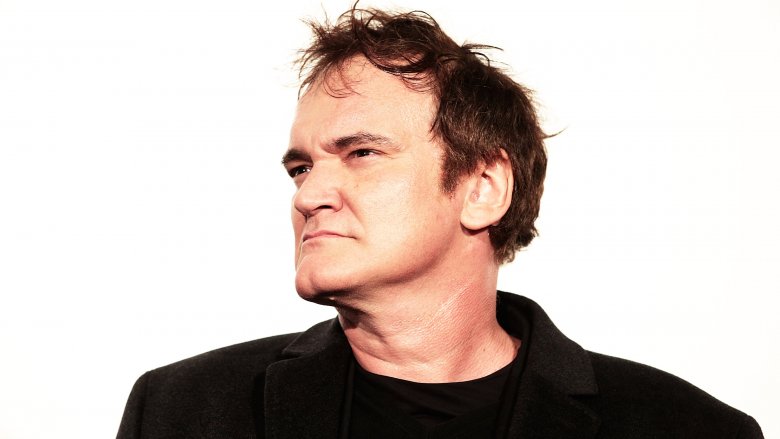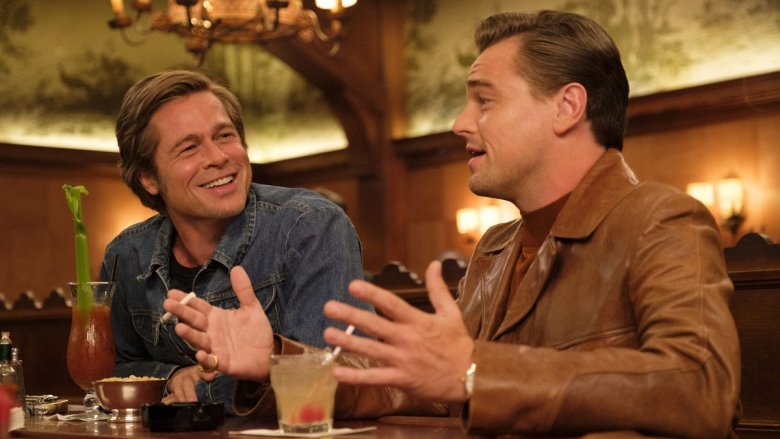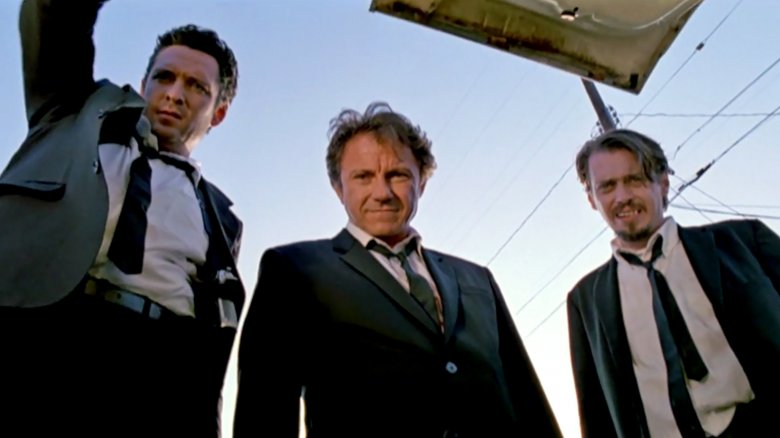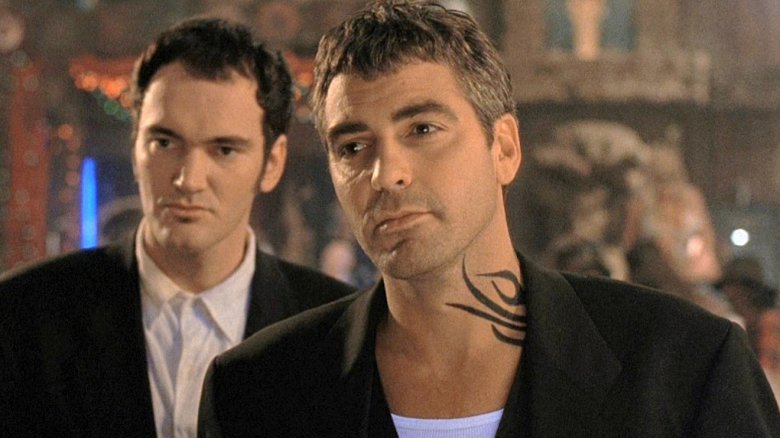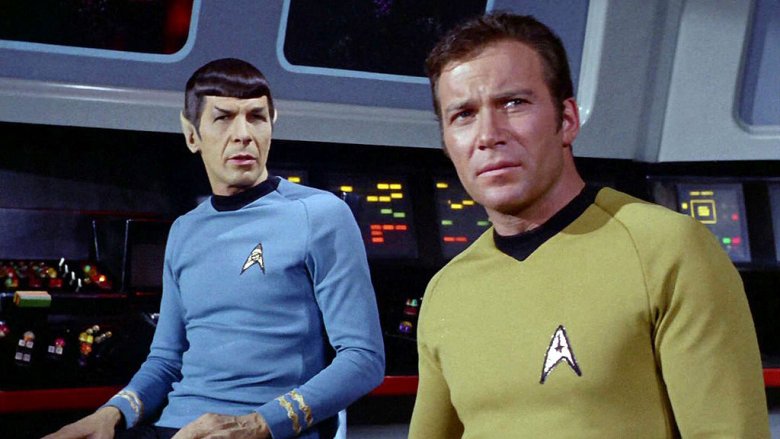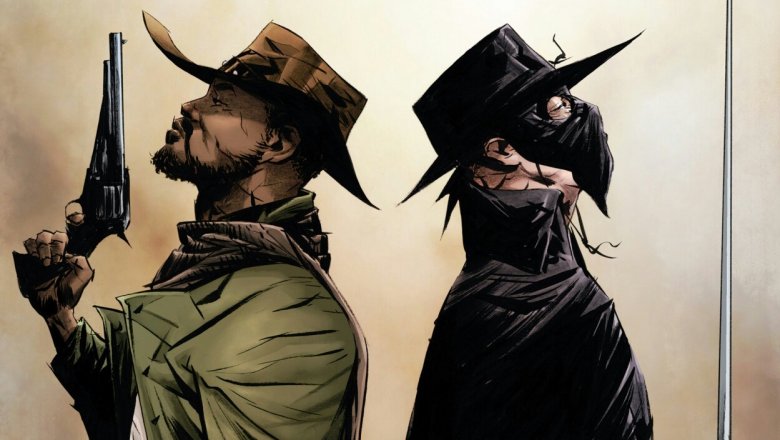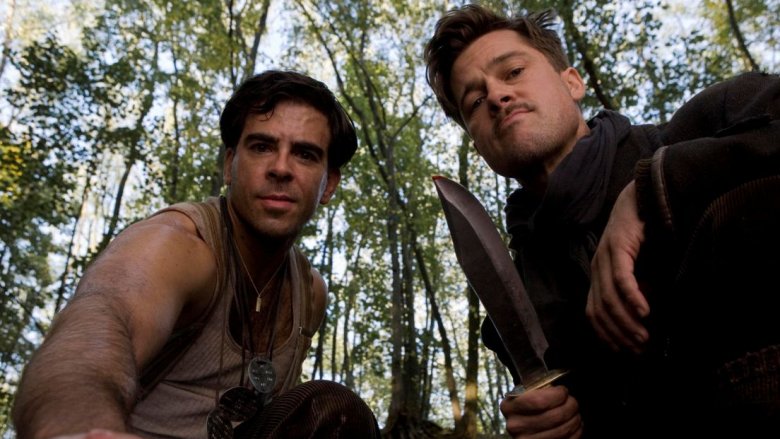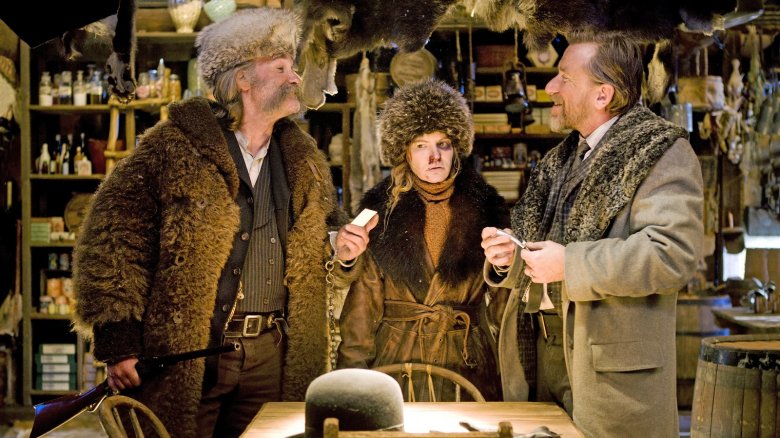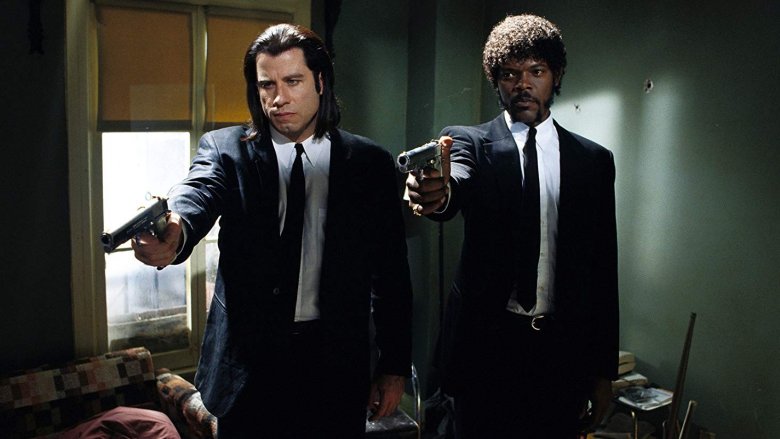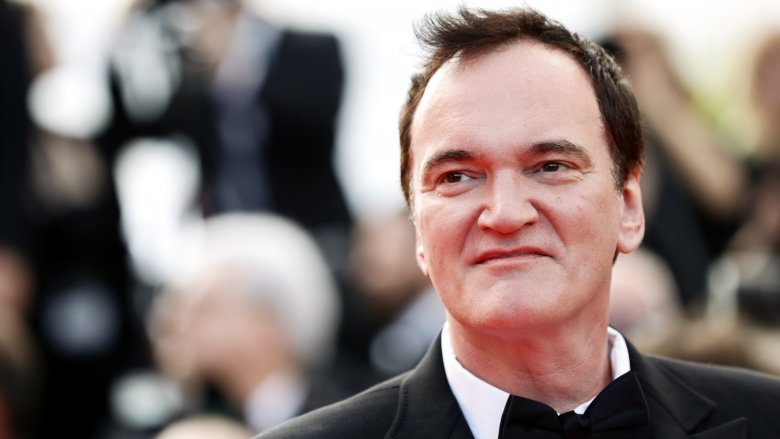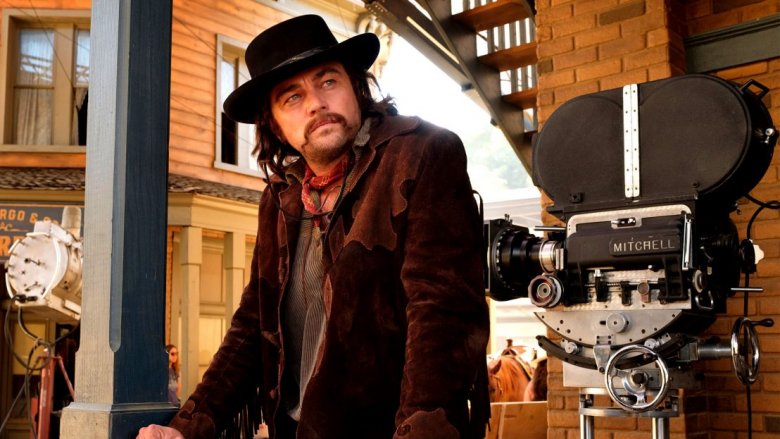The Untold Truth Of Quentin Tarantino's 10th Movie
Quentin Tarantino's ninth feature film, Once Upon a Time in Hollywood is not your typical Tarantino film. Sure, there are the usual Tarantino-isms, like the rapid-fire dialogue and the references to other movies (there may actually be more of those here, on account of its subject matter). But Once Upon a Time shows a more subdued version of the director — a more thoughtful, nostalgic one. It's a story told from a perspective of retrospection, as if nearing the end of a long and successful journey.
Tarantino has been clear about his intention to finish directing feature films at number ten. He told GQ Australia that he will have reached the end of the road by then, and with Once Upon a Time in Hollywood being his ninth, that means we only have one more Tarantino original to look forward to. Theories surrounding the details of his tenth film have been extensive. How will it fit into his overall narrative? Where (and when) will it take place? Can we expect to see Captain Kirk? This is everything we know about the director's grand finale.
Tarantino's tenth movie is going to be 'epilogue-y'
Where Once Upon a Time in Hollywood is Tarantino's penultimate feature, what the director describes (via The Hollywood Reporter) as "the big showstopping climax of it all," his next film will be the one that wraps everything up. Comparing his film career to "a train boxcar connected to each other," Tarantino told the Moscow press of his tenth and final feature, "I could imagine that the tenth one would be a little more epilogue-y."
Of course, that doesn't mean we shouldn't expect something incredible from the director. If there's one thing we can count on with Tarantino, it's that he works on a grand scale. From his penchant for violent revenge tales to bloody standoffs, Tarantino goes hard when it comes to his films' climaxes. So even if his tenth feature is intended to be more of a final note on his entire film career, there's little chance he'll be going out with a whisper.
It's going to have ties to the rest of his films
To be sure, Tarantino's tenth film will find a way to fit snugly within the director's shared movie universe — the Tarantino-verse. In 2016, he spoke to The Project and finally confirmed the theory that fans had been throwing around for years (via news.com.au). "There's the realer than real universe, alright, and all the characters inhabit that one," he said. "But then there's this movie universe. ... So basically when the characters of Reservoir Dogs or Pulp Fiction, when they go to the movies, Kill Bill is what they go to see. From Dusk Till Dawn is what they see."
Up until Once Upon a Time in Hollywood, movies were separated by a clear divide. They either existed in the "Realer than Real World Universe" or the "Movie Movie Universe." But while the characters in Once Upon a Time in Hollywood are real, the productions they appear in are part of that Movie Movie space. Where that leaves Tarantino's final film is a big question. Since it's an epilogue, it stands to reason that it, too, will exist in both universes. It will also probably feature at least one multi-film character tie-in (like how Danny Donowitz of Inglourious Basterds is related to Lee Donowitz of True Romance).
There might be a huge genre shift
So far, we've seen Tarantino tackle a multitude of genres — the heist film, the revenge thriller, and the Western, to name a few. But when it comes to horror, we've only seen him do it once, as part of his Movie Movie Universe, with 1996's From Dusk Till Dawn (which he wrote but didn't direct). It may not be out of the question to see another one, however, as Tarantino has said as recently as 2019 that he wants to make a horror film.
During an international press tour for Once Upon a Time in Hollywood, Tarantino said (via the The Independent), "If I come up with a terrific horror film story, I will do that as my tenth movie. I love horror movies. I would love to do a horror film."
The question, then, is if Tarantino were to revisit horror, what would it look like? Since From Dusk Till Dawn has already gotten the TV treatment, it's unlikely a new horror film would touch that story. But could it be another mashup of two or more genres, with in-universe nods to his other films, something along the lines of Kill Bill? Possibly another period piece? Here's hoping we won't have to wait long to find out.
It could be set in space
Back in 2017, Deadline announced that Tarantino had come up with "a great idea" for a new Star Trek movie to pitch to J.J. Abrams and Paramount. Shortly thereafter, The Revenant's Mark L. Smith was tapped to pen the script. By June 2019, the R-rated space adventure had its first draft, Tarantino confirmed to Empire Magazine (via Comicbook.com). "There's a script that exists for it now, I need to weigh in on it, but haven't been able to do that yet," he told the publication.
But will Star Trek actually be Tarantino's final film? The director talked about a possible loophole on the ReelBlend podcast (via CinemaBlend), which would allow him to make both a Star Trek and an original tenth film. Or not. "I guess I do have a loophole, [if] the idea was to throw a loophole into it," he said. "Which would be [to go], 'Uhhh, I guess Star Trek doesn't count. I can do Star Trek ... but naturally I would end on an original.'" This doesn't mean that Tarantino is looking for a loophole, though. He went on to say that if he were to do a Star Trek film, he should commit to making it his last.
About that Django/Zorro mashup ...
In the midst of the 2014 Sony hack, Business Insider reported on an email exchange between Tarantino and Sony Pictures co-chair Amy Pascal. The subject was a possible Django Unchained/Zorro crossover film. It would be based on the Dynamite comic written by Tarantino and Matt Wagner, which served as a sequel of sorts to the 2012 film.
Five years later, Collider reported that Jerrod Carmichael had been confirmed to co-write the film. According to the film's IMDb page, Tarantino is listed as the producer, but as of now, there's no indication of whether or not he'll also be serving as director.
Django/Zorro takes place several years after the events of Django Unchained. While working as a bounty hunter in the West, Django crosses paths with Diego de la Vega (Zorro), "the first wealthy white man he's ever met who seems totally unconcerned with the color of Django's skin ... and who can hold his own in a fight." He soon signs on as Diego's bodyguard, and the pair embark on a quest to liberate the local indigenous people from a life of servitude. If Tarantino did want to end his career on this epic crossover, nobody would complain.
There were once talks of an Inglourious Basterds sequel
In a 2012 interview with The Root (via Collider), Tarantino revealed that he had begun working on a sequel to 2009's Inglourious Basterds, tentatively titled Killer Crow. Set in 1944 Normandy, the film would center on a group of black soldiers who "go on an Apache warpath and kill a bunch of white soldiers and white officers on a military base and are just making a warpath to Switzerland."
Killer Crow — along with Inglourious Basterds — was originally meant to be part of a larger miniseries. When Tarantino made the decision to turn it into a film, the black soldiers storyline got cut to help "tame" the director's material. But Tarantino said he has most of the material written. "It's ready to go," he explained. "I just have to write the second half of it." If Tarantino did choose to end his career this way, it would complete his revisionist history trilogy, which includes Inglourious Basterds and Django Unchained (if we aren't including Once Upon a Time in Hollywood here, of course).
Quentin Tarantino really has a thing for period pieces
After the release of Tarantino's eighth film, The Hateful Eight, the director sat down with So Is It Any Good and dropped a few hints regarding his ideas for future movies. Along with a couple of Pulp Fiction/Reservoir Dogs spin-offs — one focused on the Vega brothers (John Travolta and Michael Madsen) in Amsterdam and the other centered on Jules (Samuel L. Jackson) — Tarantino said he had been thinking of another kind of crime story for quite some time.
"I do have an idea for an Australian film that would take place in the '30s," he said. "And it would be a Bonnie and Clyde-ish kind of story with a couple of outlaws in Australia. We'll see if it happens." He didn't elaborate any further on the idea, and it's possible that the only reason he said he was thinking of doing an Australian movie in the first place was because he was speaking with an Australian outlet. But the film could fit in to a couple of his already-established settings, should it move forward.
His tenth film could be a sequel of sorts
In 2016, Tarantino finally confirmed at the Jerusalem Film Festival (via Vanity Fair) that he does, indeed, group his movies into informal trilogies, although he insists it isn't intentional. Calling the theory "really interesting," he said it "held more water the more I thought about it." According to the publication, the groupings are as follows: the heist trilogy (Reservoir Dogs, Pulp Fiction, and Jackie Brown), the revenge trilogy (Kill Bill: Vol. 1 and Vol. 2 and Death Proof), and the period piece trilogy (Inglourious Basterds, Django Unchained, and The Hateful Eight).
But Kill Bill: Vol. 1 and Vol. 2 are widely considered to be a single film (something Tarantino recently confirmed), and Once Upon a Time in Hollywood could arguably fit into a "revisionist history" trilogy, along with Inglourious Basterds and Django Unchained. That means these defined trilogies are somewhat fluid, but it also leaves us with one film that will have to be a fourth in an established set. Of course, it also leaves room for the possibility that Tarantino's tenth film could be a standalone project.
Is Tarantino's tenth movie truly his last?
Quentin Tarantino may be dead set on ending his directing career at ten films, but he's hinted that there's some gray area as to what exactly ten films means. Speaking at the Jerusalem Film Festival (via Vanity Fair), the director said he intends for these ten films to make up his definitive collection, in that they'll act as his filmmaking legacy. Should he choose to return to feature film directing in the future, he could.
"Even if at 75, if I have this other story to tell, it would still kind of work because that would make those ten," he said. "They would be there, and that would be that. But ... that geriatric one exists completely on its own in the old folks home and is never put in the same shelf next to the other ten." Does that mean that Tarantino truly has plans to come back? At least one person doesn't think so. Brad Pitt told GQ Australia that he thinks Tarantino is "dead serious" about retirement, believing the director has an understanding of when he'll start to fall off his game.
Why does Quentin Tarantino want to stop at ten?
Just because Quentin Tarantino has said that he won't be making any more films after his tenth, that doesn't mean he won't continue to work in the entertainment industry. He told GQ Australia that he'd like to shift his focus. "I think when it comes to theatrical movies, I've come to the end of the road," he said. "I see myself writing film books and starting to write theater, so I'll still be creative. I just think I've given all I have to give to movies."
Tarantino told Deadline that while he was working on Once Upon a Time in Hollywood, he wrote a play, as well as five episodes of a TV series — Bounty Law. It's the fictional '50s western that Leonardo DiCaprio's character, Rick Dalton, starred in. And it's a project that Tarantino would like to continue. "I'll probably write about three other episodes and then just do it," he said. "Direct every episode. They're a half hour long. I wouldn't mind doing it for Netflix, but I'd want to shoot it on film. ... But I also like the fact that I built up this mythology for Bounty Law and Jake Cahill." So even when Tarantino finally steps away from movies, it looks like the filmmaker will still be around, one way or another.
